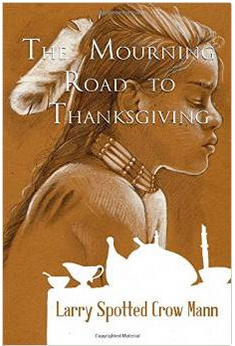Native Americans, Alcoholism & The Healing of Thanksgiving
 For most Americans, Thanksgiving is a time to gather with family and friends over a plate of turkey and a football game. However, for Native Americans, this holiday brings up some bad memories that have become a scar on American history.
For most Americans, Thanksgiving is a time to gather with family and friends over a plate of turkey and a football game. However, for Native Americans, this holiday brings up some bad memories that have become a scar on American history.
I recently attended a lecture by Native American writer Larry “Spotted Crow” Mann who discussed his latest book, The Mourning Road To Thanksgiving. Mann, a member of the Nipmuc tribe of Massachusetts, is an activist and contributor to Indian Country News. He also works with the Massachusetts Department of Public Health on sobriety issues among Native Americans.
In his lecture, he talked about how the real first Thanksgiving went down, contrary to common belief, and the lingering effects on Native Americans today.
“My existence is because of colonial resistance,” he said.
Mann states that the first Thanksgiving was really an English harvest festival. Native Americans were not invited to this feast; they actually just showed up to see what was going on. They stayed, but didn’t sit around a table; they sat on the ground. Mann says that the meal was a “segregated event,” as the English didn’t want any interaction with Native Americans. The English were careful to keep their women and children away from Native Americans because of their so-called “voodoo and heathen” activities.
“The English came here for freedom of religion, but weren’t interested in extending that belief to Native Americans,” Mann said.
Native Americans lost all their freedom eventually, as they were actually the first slaves. Nonetheless, as many of them couldn’t handle the stress of enslavement, Native Americans began to die in large numbers from suicide and smallpox.
Alcohol was also introduced to Native Americans by the English in exchange for their land, which has had a devastating effect on this group ever since. There is an ongoing argument about whether or not Native Americans are predisposed to alcoholism; however, statistics show they are disproportionately affected by it today.
According to the National Institute of Alcohol Abuse and Alcoholism (NIAAA), 12 percent of Native Americans are heavy drinkers, which is higher than any other ethnic group. Alcoholism attributes to 65 percent of car accidents on reservations and 48 percent of vehicular deaths among Native Americans. Alcohol also plays a role in the higher rate of suicides, murders and other forms of violence among the population. Native American women are twice as likely to experience domestic abuse and rape than other ethnic groups in the United States. Alcohol also causes higher rates of liver disease and cirrhosis, which is one of the leading causes of death for the population.
Mann had a hard childhood and grew up in a non-Native school. He was an alcoholic in his twenties, but stopped drinking cold turkey when he learned about how the disease has devastated his tribe.
Mann has many thoughts about how he feels about the English now, but I don’t want to spoil it, so you have to read his book! But he did say that time can be healing and we should use this time of thanksgiving to educate future generations to not repeat the mistakes of past generations.
“If you don’t know your past, how do we heal the future,” Mann said.